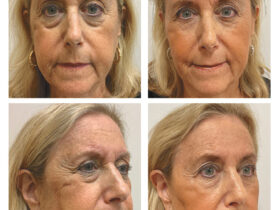By Alik Minikhanov, DACM, AP
Various studies from different publications and sources show that acupuncture supports mental health.
Mental health is a critical part of our overall well-being. While traditional mental health treatments, such as therapy and medication, have shown efficacy, complementary and alternative therapies, like acupuncture, are gaining recognition for their potential in supporting mental health.
Let’s start with one of everyone’s least favorite words: stress.
To Start Acupuncture Reduces Stress.
Stress is a prevalent issue that can lead to a range of mental health challenges, including anxiety and depression.
Acupuncture is part of an ancient practice in Traditional Chinese medicine. An acupuncturist will use hair-thin, metallic needles to penetrate the skin into specific pathways or meridians.
Inserting the needles into these pathways will promote a healthy flow of Qi, thereby improving your health.
A study conducted in 2016 found that acupuncture “has been demonstrated to enhance endogenous opiates, such as dynorphin, endorphin, encephalin, and release corticosteroids, relieving pain and enhancing the healing process.”1
Endorphins are the body’s natural painkillers and mood lifters.
This is significant because endorphins play a pivotal role in reducing anxiety and improving overall mental well-being.
Since stress can lead to larger issues such as anxiety and depression, how does acupuncture help with those conditions?
Acupuncture Reduces Anxiety and Depression too!
According to the American Psychiatric Association, “anxiety disorders are some of the most common mental health conditions worldwide, affecting nearly 30% of adults at some point in their lives.”
According to a recent study by Goyatá (2016), acupuncture may be a valuable tool in managing anxiety.
The study also found that acupuncture sessions significantly reduced anxiety symptoms in patients, indicating its potential as an adjunct therapy for anxiety management.2
Depression is a complex mental health condition, and its treatment often requires a multifaceted approach.
While acupuncture alone may not replace conventional therapies, it can be a valuable complementary treatment for individuals with depression.
A study published in 2022 indicated that when acupuncture was used in conjunction with antidepressant medication, it contributed to a more significant reduction in depressive symptoms and a decrease in medication-related side effects.3
But acupuncture can do even more for your health.
Neurotransmitter Regulation – a Better Way to Say “Chemical Messengers.”
Neurotransmitters are chemical messengers in the brain that significantly affect mood regulation.
Imbalances in neurotransmitters, such as serotonin and dopamine, are associated with mental health conditions. Research has shown that acupuncture can help regulate neurotransmitter levels in the brain.
The findings from a study researching the impact of acupuncture on serotonin and dopamine levels suggested that acupuncture can increase the availability of these neurotransmitters, promoting feelings of well-being and emotional stability.4
Scientists have begun to study further which parts of the brain acupuncture affects to understand its benefits.
Brain Imaging Provides a Clearer Picture of the Benefits.
Advancements in neuroimaging have allowed researchers to study the effects of acupuncture on the brain. Functional magnetic resonance imaging (fMRI) studies have provided insight into how acupuncture impacts the brain’s structure and function, shedding light on its role in supporting mental health.
One study, published in the Journal of Integrative Medicine, used fMRI to investigate the effects of acupuncture on the brain regions associated with mood and emotion regulation. The results showed that acupuncture modulated the activity of these regions, suggesting that it could have a role in improving mood and emotional well-being.5
As much as your mind affects your mental health it also affects your digestive health.
The Gut-Brain Connection
Maybe you’ve heard of this one recently. It’s a new way of thinking about our health. Until recently, scientists thought that anxiety and depression were the cause of our gut problems when it’s the other way around.
Recent research has highlighted the connection between the gut and mental health, known as the “gut-brain axis.” The balance of gut microbiota can influence mood and emotional well-being. Acupuncture has been studied for its potential to affect the gut-brain axis positively.
The same study, published in 2021, explored how acupuncture influenced gut microbiota in rats. The findings revealed that acupuncture treatment led to a positive shift in gut microbiota composition, which could affect mental health improvements.6
The benefits of acupuncture are robust. But it works so well because each individual will experience results.
Acupuncture can be Tailored to the Individual.
Acupuncturists assess each patient’s unique constitution and symptoms to create a personalized treatment plan.
This tailored approach ensures that the treatment addresses the specific needs and imbalances of the individual, making it a holistic and patient-centered therapy designed to enhance your well-being physically and mentally.
Acupuncture Helps Improve Mental Health
Scientific research demonstrates the potential of acupuncture as a valuable tool in supporting mental health.
Acupuncture can reduce stress, alleviate anxiety, mitigate depression, improve sleep quality, regulate neurotransmitters, and influence brain activity. Furthermore, its impact on the gut-brain axis adds another layer to its therapeutic potential.
While acupuncture should not replace conventional mental health treatments, it can be a complementary therapy that enhances overall well-being. As more research is conducted, acupuncture’s role in mental health care is likely to gain further recognition and acceptance.
If you’re considering acupuncture as part of your mental health management, consult with a licensed acupuncturist like Dr. Alik to discuss your individual needs.
I AM DESIGNED TO HEAL
239.322.3817
WWW.IAMDESIGNEDTOHEAL.COM
826 Anchor Rode Dr., Naples, FL 34103
References:
1. Patil, Shilpadevi et al. “The Role of Acupuncture in Pain Management.”
Current pain and headache reports vol. 20,4 (2016): 22.
doi:10.1007/s11916-016-0552-1
2. Goyatá, Sueli Leiko Takamatsu et al. “Effects from acupuncture in treating anxiety: integrative review.” “Efeitos da acupuntura no tratamento da ansiedade: revisao integrativa.” Revista brasileira de enfermagem vol. 69,3 (2016): 602-9. doi:10.1590/0034-7167.2016690325i
3. Yang, Na-Na et al. “Potential Mechanisms and Clinical Effectiveness of Acupuncture in Depression.” Current neuropharmacology vol. 20,4 (2022): 738-750. doi:10.2174/1570159X19666210609162809
4. Lin, Jaung-Geng et al. “Understandings of acupuncture application and mechanisms.” American journal of translational research vol. 14,3 1469-1481. 15 Mar. 2022
5. Cai, Rong-Lin et al. “Brain functional connectivity network studies of acupuncture: a systematic review on resting-state fMRI.” Journal of integrative medicine vol. 16,1 (2018): 26-33. doi:10.1016/j.joim.2017.12.002
6. Li, Peng et al. “Acupuncture Can Play an Antidepressant Role by Regulating the Intestinal Microbes and Neurotransmitters in a Rat Model of Depression.” Medical science monitor : international medical journal of experimental and clinical research vol. 27 e929027. 27 May. 2021, doi:10.12659/MSM.929027









